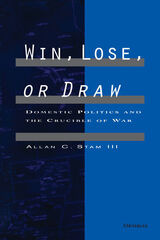2 books about Stam III, Allan C.

The Behavioral Origins of War
D. Scott Bennett and Allan C. Stam
University of Michigan Press, 2003
In The Behavioral Origins of War, D. Scott Bennett and Allan C. Stam analyze systemic, binary, and individual factors in order to evaluate a wide variety of theories about the origins of war.
Challenging the view that theories of war are nothing more than competing explanations for observed behavior, this expansive study incorporates variables from multiple theories and thus accounts for war's multiplicity of causes. While individual theories offer partial explanations for international conflict, only a valid set of theories can provide a complete explanation. Bennett and Stam's unconventional yet methodical approach opens the way for cumulative scientific progress in international relations.
D. Scott Bennett is Professor of Political Science at the Pennsylvania State University. Allan C. Stam is Associate Professor in the Government Department at Dartmouth College.
Challenging the view that theories of war are nothing more than competing explanations for observed behavior, this expansive study incorporates variables from multiple theories and thus accounts for war's multiplicity of causes. While individual theories offer partial explanations for international conflict, only a valid set of theories can provide a complete explanation. Bennett and Stam's unconventional yet methodical approach opens the way for cumulative scientific progress in international relations.
D. Scott Bennett is Professor of Political Science at the Pennsylvania State University. Allan C. Stam is Associate Professor in the Government Department at Dartmouth College.
[more]

Win, Lose, or Draw
Domestic Politics and the Crucible of War
Allan C. Stam III
University of Michigan Press, 1999
While the factors affecting the initiation of war have been extensively studied, the factors that determine the outcome of war have been neglected. Using quantitative data and historical illustrations from the early 1800s to the late 1980s, Allan Stam investigates the relative effect on war outcomes of both the choices leaders must make during war and the resources they have at their disposal. Strategy choices, along with decisions about troop levels and defense spending, are not made in a vacuum, according to Stam, but are made in the crucible of domestic politics. Because of domestic political constraints, states must frequently choose less than optimal strategies in the international arena. Stam shows how we must go beyond simply counting resources and look at the process or strategy by which they are employed as the key factor determining who will win.
Challenging the assumptions of many realist and neorealist thinkers on war and interstate conflict, Stam shows how domestic political factors affect the outcome of war. Using a rational choice analysis, Stam looks at the factors that affect the decisionmakers' preferences for different outcomes of military conflict, as well as how the payoffs of those outcomes are affected by both domestic and structural factors. Structural factors, such as the state's population, define a state's power relative to that of other states and will affect the probability of a policy succeeding. Domestic factors, such as the positions taken by domestic political groups, will affect the preferences of the leaders for particular outcomes and their willingness to bear the costs associated with the payoffs and probabilities of the various outcomes.
This book will be of interest to political scientists studying war and conflict in the international system as well as to historians and military strategists interested in understanding the factors that predict the outcome of war.
Allan Stam is Assistant Professor of Political Science, Yale University.
Challenging the assumptions of many realist and neorealist thinkers on war and interstate conflict, Stam shows how domestic political factors affect the outcome of war. Using a rational choice analysis, Stam looks at the factors that affect the decisionmakers' preferences for different outcomes of military conflict, as well as how the payoffs of those outcomes are affected by both domestic and structural factors. Structural factors, such as the state's population, define a state's power relative to that of other states and will affect the probability of a policy succeeding. Domestic factors, such as the positions taken by domestic political groups, will affect the preferences of the leaders for particular outcomes and their willingness to bear the costs associated with the payoffs and probabilities of the various outcomes.
This book will be of interest to political scientists studying war and conflict in the international system as well as to historians and military strategists interested in understanding the factors that predict the outcome of war.
Allan Stam is Assistant Professor of Political Science, Yale University.
[more]
READERS
Browse our collection.
PUBLISHERS
See BiblioVault's publisher services.
STUDENT SERVICES
Files for college accessibility offices.
UChicago Accessibility Resources
home | accessibility | search | about | contact us
BiblioVault ® 2001 - 2024
The University of Chicago Press









